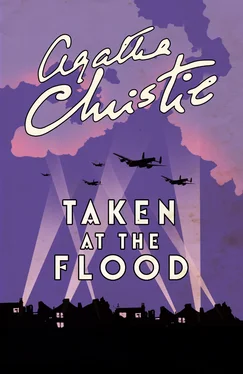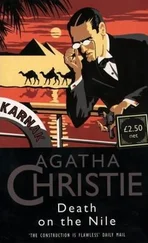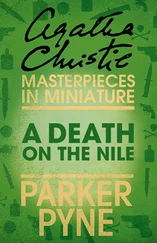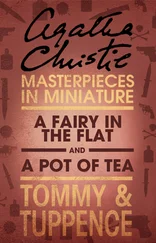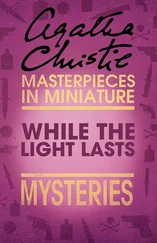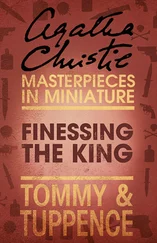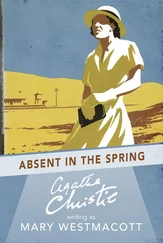Something seemed to pass through the room—a cold air—the shadow of a thought…
Frances said: ‘You didn’t tell me that… I thought she got it for keeps—that she could leave it to any one she liked?’
‘No. By the statute relating to intestacy of 1925…’
It is doubtful whether Frances listened to his explanation. She said when his voice stopped:
‘It hardly matters to us personally. We’ll be dead and buried, long before she’s middle-aged. How old is she? Twenty-five—twenty-six? She’ll probably live to be seventy.’
Jeremy Cloade said doubtfully:
‘We might ask her for a loan—putting it on family grounds? She may be a generous-minded girl—really we know so little of her—’
Frances said: ‘At any rate we have been reasonably nice to her—not catty like Adela. She might respond.’
Her husband said warningly:
‘There must be no hint of—er—real urgency.’
Frances said impatiently: ‘Of course not! The trouble is that it’s not the girl herself we shall have to deal with. She’s completely under the thumb of that brother of hers.’
‘A very unattractive young man,’ said Jeremy Cloade.
Frances’ sudden smile flashed out.
‘Oh, no,’ she said. ‘He’s attractive. Most attractive. Rather unscrupulous, too, I should imagine. But then as far as that goes, I’m unscrupulous too!’
Her smile hardened. She looked up at her husband.
‘We’re not going to be beaten, Jeremy,’ she said. ‘There’s bound to be some way…if I have to rob a bank!’
‘Money!’ said Lynn.
Rowley Cloade nodded. He was a big square young man with a brick-red skin, thoughtful blue eyes and very fair hair. He had a slowness that seemed more purposeful than ingrained. He used deliberation as others use quickness of repartee.
‘Yes,’ he said, ‘everything seems to boil down to money these days.’
‘But I thought farmers had done so well during the war?’
‘Oh, yes—but that doesn’t do you any permanent good. In a year we’ll be back where we were—with wages up, workers unwilling, everybody dissatisfied and nobody knowing where they are. Unless, of course, you can farm in a really big way. Old Gordon knew. That was where he was preparing to come in.’
‘And now—’ Lynn asked.
Rowley grinned.
‘And now Mrs Gordon goes to London and spends a couple of thousand on a nice mink coat.’
‘It’s—it’s wicked!’
‘Oh, no—’ He paused and said: ‘I’d rather like to give you a mink coat, Lynn—’
‘What’s she like, Rowley?’ She wanted to get a contemporary judgment.
‘You’ll see her tonight. At Uncle Lionel’s and Aunt Kathie’s party.’
‘Yes, I know. But I want you to tell me. Mums says she’s half-witted?’
Rowley considered.
‘Well—I shouldn’t say intellect was her strong point. But I think really she only seems half-witted because she’s being so frightfully careful.’
‘Careful? Careful about what?’
‘Oh, just careful. Mainly, I imagine, about her accent—she’s got quite a brogue, you know, or else about the right fork, and any literary allusions that might be flying around.’
‘Then she really is—quite—well, uneducated?’
Rowley grinned.
‘Oh, she’s not a lady, if that’s what you mean. She’s got lovely eyes, and a very good complexion—and I suppose old Gordon fell for that, with her extraordinary air of being quite unsophisticated. I don’t think it’s put on—though of course you never know. She just stands around looking dumb and letting David run her.’
‘David?’
‘That’s the brother. I should say there’s nothing much about sharp practice he doesn’t know!’ Rowley added: ‘He doesn’t like any of us much.’
‘Why should he?’ said Lynn sharply, and added as he looked at her, slightly surprised, ‘I mean you don’t like him .’
‘I certainly don’t. You won’t either. He’s not our sort.’
‘You don’t know who I like, Rowley, or who I don’t! I’ve seen a lot of the world in the last three years. I—I think my outlook has broadened.’
‘You’ve seen more of the world than I have, that’s true.’
He said it quietly—but Lynn looked up sharply.
There had been something—behind those even tones.
He returned her glance squarely, his face unemotional. It had never, Lynn remembered, been easy to know exactly what Rowley was thinking.
What a queer topsy-turvy world it was, thought Lynn. It used to be the man who went to the wars, the woman who stayed at home. But here the positions were reversed.
Of the two young men, Rowley and Johnnie, one had had perforce to stay on the farm. They had tossed for it and Johnnie Vavasour had been the one to go. He had been killed almost at once—in Norway. All through the years of war Rowley had never been more than a mile or two from home.
And she, Lynn, had been to Egypt, to North Africa, to Sicily. She had been under fire more than once.
Here was Lynn Home-from-the-wars, and here was Rowley Stay-at-home.
She wondered, suddenly, if he minded…
She gave a nervous little half laugh. ‘Things seem sometimes a bit upside down, don’t they?’
‘Oh, I don’t know.’ Rowley stared vacantly out over the countryside. ‘Depends.’
‘Rowley,’ she hesitated, ‘did you mind —I mean—Johnnie—’
His cold level gaze threw her back on herself.
‘Let’s leave Johnnie out of it! The war’s over—and I’ve been lucky.’
‘Lucky, you mean’—she paused doubtfully—‘not to have had to—to go?’
‘Wonderful luck, don’t you think so?’ She didn’t know quite how to take that. His voice was smooth with hard edges. He added with a smile, ‘But, of course, you service girls will find it hard to settle down at home.’
She said irritably, ‘Oh, don’t be stupid, Rowley.’
(But why be irritable? Why—unless, because his words touched a raw nerve of truth somewhere.)
‘Oh well,’ said Rowley. ‘I suppose we might as well consider getting married. Unless you’ve changed your mind?’
‘Of course I haven’t changed my mind. Why should I?’
He said vaguely:
‘One never knows.’
‘You mean you think I’m’—Lynn paused—‘different?’
‘Not particularly.’
‘Perhaps you’ve changed your mind?’
‘Oh, no, I’ve not changed. Very little change down on the farm, you know.’
‘All right, then,’ said Lynn—conscious, somehow, of anticlimax, ‘let’s get married. Whenever you like.’
‘June or thereabouts?’
‘Yes.’
They were silent. It was settled. In spite of herself, Lynn felt terribly depressed. Yet Rowley was Rowley—just as he always had been. Affectionate, unemotional, painstakingly given to understatement.
They loved each other. They had always loved each other. They had never talked about their love very much—so why should they begin now?
They would get married in June and live at Long Willows (a nice name, she had always thought) and she would never go away again. Go away, that is to say, in the sense that the words now held for her. The excitement of gangplanks being pulled up, the racing of a ship’s screw, the thrill as an aeroplane became airborne and soared up and over the earth beneath. Watching a strange coastline take form and shape. The smell of hot dust, and paraffin, and garlic—the clatter and gabble of foreign tongues. Strange flowers, red poinsettias rising proudly from a dusty garden… Packing, unpacking—where next?
All that was over. The war was over. Lynn Marchmont had come home. Home is the sailor, home from the sea… But I’m not the same Lynn who went away, she thought.
Читать дальше
